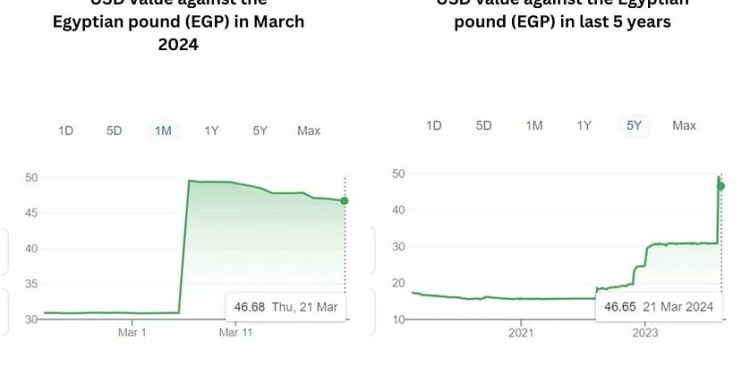#Egypt #potatomarket #currencydevaluation #agriculturaltrade #globalmarkets #economicfluctuations #geopoliticaltensions #supplychainresilience
Amidst geopolitical tensions and economic shifts, Egypt’s potato exports face both obstacles and opportunities. Explore the implications of currency devaluation on the potato market, and how it intersects with broader agricultural trends.
The Egyptian pound’s sudden devaluation on March 6, 2024, triggered significant repercussions across international potato markets. With the US dollar soaring against the local currency by over 61% in a single day, Egypt’s position as a key potato exporter shifted dramatically. Over the past two years, the Egyptian pound has depreciated more than three-fold, amplifying the impact of this recent currency fluctuation.
This currency devaluation coincided with Egypt’s active potato export season, further intensifying its influence on global markets. Given that potatoes rank among Egypt’s primary export crops and European potato prices are already soaring, the timing of this devaluation could not have been more crucial. It effectively alleviated some of the strain on potato shortages and temporarily stabilized prices.
Egypt stands as one of the world’s top 5 potato exporters, supplying markets across the globe. Key destinations for Egyptian potatoes include Russia, the European Union, the UAE, Lebanon, Iraq, Kuwait, and Syria, with exports even reaching distant countries like Indonesia. Despite geopolitical challenges, such as the Houthi terror in the Red Sea disrupting exports, Egypt’s attractiveness as a potato supplier to the EU has surged amidst currency devaluation.
The implications of Egypt’s currency woes extend beyond immediate market reactions. Farmers, agronomists, agricultural engineers, and farm owners must navigate these dynamics to optimize their strategies and mitigate risks. Currency fluctuations underscore the interconnectedness of global agricultural markets, highlighting the need for resilience and adaptability in the face of evolving economic landscapes.
Egypt’s potato market, influenced by the sharp devaluation of the Egyptian pound, reflects the intricate dance of economic forces shaping global agricultural trade. As farmers and stakeholders across the agricultural sector adapt to currency fluctuations and geopolitical tensions, strategic foresight and flexibility become paramount. In navigating these challenges, opportunities emerge for innovation and collaboration, ensuring the resilience of potato markets amidst uncertainty.







